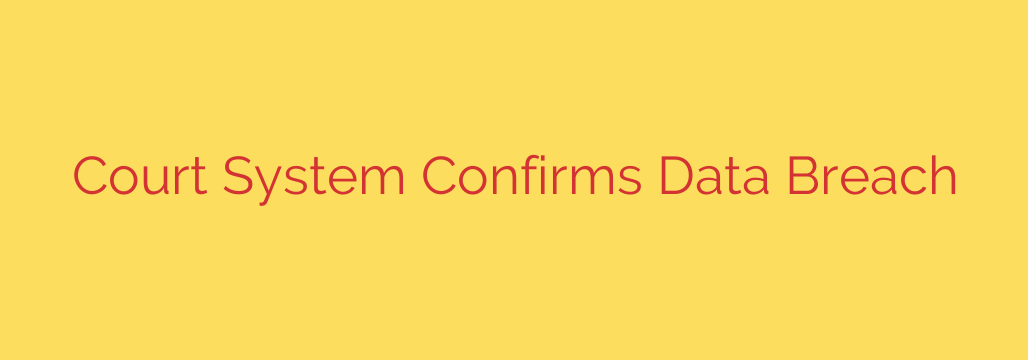
Court System Data Breach: How to Protect Your Personal Information Now
A major judicial system has officially confirmed it was the target of a significant cybersecurity incident, leading to a serious data breach that may have exposed the sensitive personal information of countless individuals. This is not just another corporate hack; the compromise of a court system’s data carries unique and severe risks for anyone who has interacted with the legal process.
The breach was the result of a sophisticated cyberattack that allowed unauthorized actors to access and potentially steal confidential files. While the full extent of the compromise is still under investigation, the implications are deeply concerning.
What Information Was Exposed?
Court systems handle some of the most sensitive data imaginable. The information compromised in this breach could include a wide range of personally identifiable information (PII).
Key data at risk includes:
- Names, addresses, and dates of birth
- Social Security numbers
- Driver’s license numbers
- Financial account information
- Detailed information from legal case files
The breach could affect anyone who has interacted with the court system, including plaintiffs, defendants, witnesses, jurors, and legal professionals. The data contained within case files can be particularly damaging, as it may include medical records, financial disputes, and other highly personal matters.
The Investigation and Official Response
Upon discovering the unauthorized access, officials immediately launched a comprehensive investigation to determine the scope and nature of the attack. Federal law enforcement agencies are now involved in a full-scale investigation to identify the perpetrators and understand the extent of the data theft.
The court system is working to secure its network and prevent further unauthorized access. Individuals whose information is confirmed to have been compromised will likely be notified directly, but this process can take time. It is crucial not to wait for official notification before taking steps to protect yourself.
Why This Breach is Especially Dangerous
Unlike retail or social media breaches, a court system data leak presents a more severe threat. The compromised data could be used for highly targeted phishing scams, identity theft, or even blackmail.
Cybercriminals armed with detailed information from legal proceedings can craft incredibly convincing scams. They might impersonate lawyers, court officials, or law enforcement to trick victims into providing more information or sending money. The sensitive nature of legal disputes also creates the potential for intimidation or extortion.
Actionable Steps to Safeguard Your Identity
If you have any reason to believe you have interacted with the affected court system, you must act now to protect your personal and financial information.
1. Monitor Your Financial Accounts and Credit Reports
Scrutinize your bank statements, credit card bills, and credit reports for any unfamiliar activity. You are entitled to free weekly credit reports from the three major bureaus (Equifax, Experian, and TransUnion) at AnnualCreditReport.com. Look for new accounts opened in your name or inquiries you don’t recognize.
2. Place a Fraud Alert or Credit Freeze
A fraud alert notifies creditors to take extra steps to verify your identity before opening a new account. For even stronger protection, consider a credit freeze, which restricts access to your credit report, making it much more difficult for criminals to open new lines of credit in your name. A freeze is free to place and unfreeze with all three credit bureaus.
3. Be on High Alert for Phishing Scams
Be extremely suspicious of any unsolicited emails, text messages, or phone calls claiming to be from the court system, a law firm, or a government agency. Never click on suspicious links or download attachments. Official bodies will rarely ask for sensitive information like your Social Security number or passwords via email.
4. Strengthen Your Online Security
Use strong, unique passwords for all of your online accounts, especially for banking and email. Enable two-factor authentication (2FA) wherever possible. This adds a critical layer of security that can stop a hacker even if they have your password.
While the full fallout from this breach is still unfolding, taking these immediate, proactive measures is the most effective way to defend against identity theft and financial fraud.
Source: https://www.bleepingcomputer.com/news/security/us-judiciary-confirms-breach-of-court-electronic-records-service/








